Commentary provided by Daryll K. Harris, Product and Marketing Strategy Vice President at J.P. Morgan Chase and ACLU-DE Board Member
Delaware, like most other places across the nation, is still feeling the economic impacts of a global pandemic. Rising inflation is making the price of basic necessities like rent, groceries, and gas soar — and people are reeling from those effects. At the same time, employers are struggling to find people to work across many different fields, compounding our economy’s struggles.
In times like these, it seems there are a lot of hard questions and never enough good answers, but when it comes to employment and the economy, there’s a solid next step for Delaware: reform the state’s probation system. Removing probation-related barriers that make it hard for people to work will enable employers to access this untapped workforce while also promoting pathways to economic stability for Delawareans and their families.
Employment is a requirement for many on probation in Delaware, but the rules of probation can make it incredibly hard to find and keep a job — which makes employers less likely to hire and work with people serving a probation sentence. For instance, people on probation often must adhere to strict curfews, abide by travel restrictions, cannot get their drivers’ license reinstated, and are required to report to probation-related meetings frequently during the work day. All of these are common examples of the many barriers to stable employment for a person on probation.
When people are unable to find and keep stable employment, they become trapped in a cycle of poverty and could even end up back in prison. Neither of those outcomes enable folks to contribute positively to our economy or fill the many job vacancies across the state. It also inevitably costs taxpayers by feeding more people back into the legal system and thwarting rehabilitation.
The good news? It doesn’t have to be this way, and making changes to our probation system would remove barriers to employment for people on probation.
A bill proposed in June by Senator Marie Pinkney would eliminate some of the barriers many face on their way to successfully completing probation sentences. It would enable the customization of conditions of probation to meet individual needs, which would help reduce instances where people are sent back to prison for slipping and missing the mark on strict probation requirements (like if they cannot get transportation and miss a probation check-in, for example).
A bill like this could significantly improve the economic contributions of people on probation in Delaware by:
- Not sending people back to prison for minor technical violations like missing a probation check-in, because people can’t contribute to the economy when they’re in prison;
- Allowing probation to be customized to meet individual needs, enabling people to have probation terms that works for their employment needs;
- Investing in community-based reentry programs, which could help people identify work opportunities; and
- Limiting probation terms to 1 year to limit the amount of time a person must navigate the barriers of probation while trying to maintain employment.
Employers can play an important role in reforming Delaware’s probation system, too, simply by committing to hire people on probation and work with them around the barriers the probation system creates. Research from the Prison Policy Initiative shows formerly incarcerated people want to find employment: Over 90% of people between the ages of 25 and 44 who have been incarcerated are either working or actively looking for a job.
If you’re an employer struggling to find employees in Delaware, don’t you want to tap into that resource? Given the opportunity, a person on probation who you’ve previously overlooked could be your company’s next top-selling marketer, highest-producing assembly person, or most reliable and dedicated team member. Giving people on probation an avenue to succeed can help your bottom line.
It is well-known that obtaining stable employment is a key factor in reducing recidivism, yet too many people on probation continue to be left out of the workforce. By reforming Delaware’s probation system, and encouraging employers to create more partnerships by hiring people on probation, we can boost Delaware’s economy and make an impact on the workforce shortage plaguing employers across the state.
Probation reform is good for our communities and good for our economy. Everyone makes mistakes, but when someone has turned their life around, they should be able to find their way to economic opportunity and stability — Delaware’s success is dependent upon their success.
On Tuesday, November 8, you have an opportunity to vote for candidates in Delaware who support making changes to the probation system that will set more people up for success. I encourage you to visit VoteDelaware.org to find out where your candidates stand on probation reform and other important issues.
Daryll K. Harris is a Product and Marketing Strategy Vice President at JPMorgan Chase in Wilmington. Daryll has over 15 years of Financial Services industry experience specializing in Project Management, Process Improvement, Operations, and Strategic Leadership.
Daryll holds an PMP certification through PMI and has a B.A. in Business Management from Wilmington University. Daryll currently volunteers at the United Way of Delaware supporting their Racial Justice Collaborative, is a member of the Delaware Valley Chapter of PMI, and serves on the board of the ACLU of Delaware.




